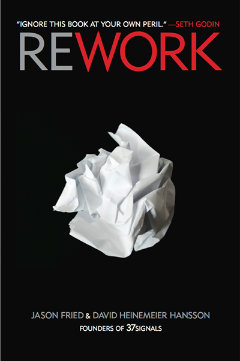The Best Pitch in a Good While
I updated this review with one important thing. If you already read the blogpost, feel free to skip directly to the bottom.
Some people are astonished at how some people can stand for hours on end to queue for a two-hour commercial, presented by Steve Jobs. Well, I just finished reading 270-odd pages of advertisement for a workplace, and I will encourage you to do the same. No, it's not a position I found on Craigslist. It was the book Rework.

The book is written by the founders of 37signals (their blog is a highly recommended read, btw,) Jason Fried and David Heinemeier Hansson. According to the introduction, it's a book about stuff they have found out to work in real business life. This would mean, what they talk about isn't some idealistic blabber; this would mean it's tried, it's doable, and it really works.
The book is a collection of 87 (hope I counted them right) pieces of wisdom. Each starts with a radical claim in the form of just a few words. Then they proceed to give a clear and concise explanation in just one or two pages on why it, indeed, is so. The language is down to earth, buzzword-free, friendly and convincing. It's CEO-level advice spoken with coffee-break-level words.
I found myself nodding to this book more than I tend to nod with Infected Mushroom's Artillery. I've been nodding either due to relief of not being alone with a thought (such as Forget about formal education,) due to obvious-to-me-ness (like Marketing is not a department,) or due to holy-shit moments (e.g. Embrace constraints.) There was not a single advice that I personally would disagree with (see update). And almost all of them I would heartily welcome.
While the book is about 270 pages long, it's a very quick read, thanks to its easy langauge, large type and refreshing illustrations. A handful of hours is all it takes to read it from cover to cover. Although the book is written primarily for business owners (current or future ones), there are the occasional nuggets of gold that anyone can benefit from and try to make a difference (like Meetings are toxic.) There is absolutely no reason for anyone interested in a pleasant workplace not to read it. All the less reason for people wielding some corporate power. As Seth Godin so fittingly puts it: Ignore this book at your own peril.
Rework has reminded me why I would never be happy working in a huge, multinational corporation. As it appears, this book stands for much that I, too, stand for. What the authors write about represents a workplace I would greatly enjoy being a part of.
Update!
There is one crucial thing that I disagree with: Interruption is the enemy of productivity. It claims that offices with open space is not as great as everyone thinks, and as you constantly get interrupted by people talking to or around you, you get less done. Well, actually, I'm not disagreeing with this, since it makes perfect sense. But what I'm objecting to is taking this rule to the extreme.
If you abolish all kinds of interruptions, you would effectively seal everyone to their own small little soundproof, locked-door cell, and nobody may talk to eachother directly. The piece does mention that passive communication is ok (e.g. email), while active is not (talk, meetings, phone, IM.)
The key to a successful project, in my mind, is good communication. Communication should be open, and there shouldn't be any protocol to do that. Once you put obstacles in front of communication within your project, people will slowly just stop asking about those little "meaningless" things. It turns out, those meaningless things are often not that meaningless after all, but those nuances that takes your product from merely good to excellent.
Sure, nobody likes interruptions. But I like to communicate with my collagues. Consider a good compromise. My suggestion (as if I would have any weight) is to cut unnecessary interruptions. Allow people to opt-out from interruptions, don't interrupt people with out-of-topic things. But don't discourage communication. That's not a workplace I want to work at.
blog comments powered by Disqus
